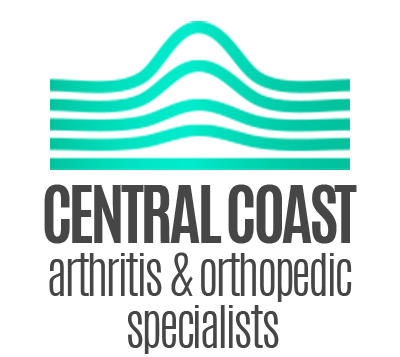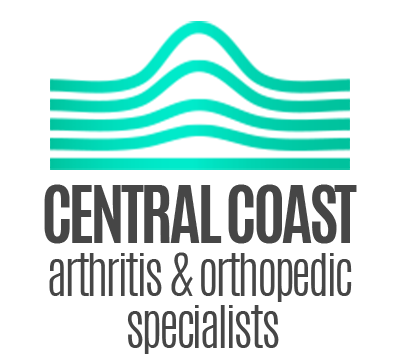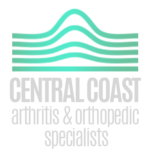Frequently asked questions
Find the answers to some of our most commonly asked questions below. If you don’t find what you are looking for or have further questions or concerns, please give us a call.
Are you taking new patients?
Central Coast Arthritis and Orthopedic Specialists is accepting new patients, most of whom are referred by a local primary care physician.
Getting an appointment with Dr. Orlando is straightforward. All new a new patient needs to do is call or request an appointment online. Your insurance information will be taken over the phone and CCAOS staff will obtain preauthorization, if necessary, prior to the visit. If you would like, our staff will send you forms to fill out at home before your visit– or you can get the forms yourself here.
I am a new patient- what should I bring to my first appointment?
The most important thing to bring if you are a new patient is any prior x-rays, MRIs or CT scans related to your medical condition. Please be sure to bring the actual studies on a CD along with the radiology report. When the patient arrives without this documentation, it takes a considerable amount of time and effort for CCAOS staff to locate the imagery and delays the visit.
Most imaging centers in the area allow CCAOS to access to their studies online. Just inform the CCAOS staff where your studies were performed so that we can determine whether we have access or if you need to bring the studies on a CD.
Do you perform post-surgery recovery treatment?
Yes, Dr. Orlando sees patients through the postoperative recovery and rehabilitation phase. He performs follow-ups on patients in the office for wound checks, to help manage pain, and then to refer to the appropriate physical therapist. Patient progress is monitored throughout their physical therapy and recovery. Dr. Orlando generally does not release patients from his care until they return to their normal activities and or sport.
Will I need pain medication after the surgery?
Your surgeon will provide pain medication to help keep you comfortable. Initially, you will need a narcotic such as Norco or Percocet, though you will eventually be able to transition to ibuprofen, naproxen, or Tylenol to manage your pain. In addition, icing the extremity will help significantly with the swelling and pain. It is recommended to ice the extremity for 20-30 minutes several times a day for the first several days after surgery. An ice machine is also readily available at CCOAS to help patients manage pain during the recovery period. Please do not hesitate to call for details.
How long does it take to recover from surgery?
The answer to this question depends on the procedure performed, severity of the problem, and the individual patient. Obviously, some patients take longer than others to recover from the same procedure, and Dr. Orlando cannot predict who will recover quickly or slowly.
That said, the time periods below typify most patient recovery times:
Shoulder arthroscopy usually takes 3-8 months
Shoulder replacement: 4-8 months
Knee arthroscopy: meniscal tears 6-8 weeks
ACL repair 3-5 months
ACL reconstruction 8-10 months
Knee replacement: Total 6-8 months
Partial 3-4 months
Hip Arthroscopy: labral debridment 3-6 months
Labral repair 6-8 months
What is the cost of surgery?
As you might expect, the cost of surgery depends on the procedure, what implants are needed, and whether the surgery is performed on an inpatient or an outpatient basis. Implants can be either the components for knee or shoulder replacements, screws, plates, anchors and different types of tissue grafts. Generally, if implants are needed, surgery costs increase.
Inpatient surgery done at the hospital is always much more costly than at an outpatient surgery center, generally by several thousand dollars. For example, a simple, 20-minute outpatient arthroscopic knee meniscal surgery can cost $5-$10,000. An inpatient, 60-minute total knee replacement surgery at the hospital can cost $40,000 or more.
For ACL injuries, patients should consider the costs associated with tissue grafts. For ACL reconstruction, using a tendon from your leg (an autograft) has no additional cost, while using a cadaver graft (allograft) from a tissue bank is much more costly.
This is all to say that there is a wide spectrum of costs and that each case is different. The CCAOS staff should be able to provide a ballpark figure for your specific medical condition, so give us a call.
What does a doctor specializing in sports medicine treat?
Sports medicine doctors work with athletes on a variety of issues in multiple settings. Sports medicine doctors can be orthopedic surgeons and/or primary care physicians who prescribe treatments for professional, amateur, and recreational athletes. They’re trained to address issues associated with sports mechanics and may also counsel athletes on injury prevention. In addition, they sometimes focus on special groups of people, such as young children or the elderly. Physicians specializing in sports medicine often
- Diagnose and treat athletic injuries
- Design treatment and rehabilitation strategies
- Consult with patients about their recovery progress
- Prescribe medication
Sports medicine doctors also work alongside physical therapists to create rehabilitation plans or with athletic trainers to develop appropriate exercise regimens. Sports medicine doctors may work in a variety of environments, including hospitals, medical clinics, physical therapy practices, high schools, colleges and universities, and professional sports organizations.
Dr. Carlo Orlando is an orthopedic surgeon specializing in sports medicine and has been practicing in California for over 20 years. He specializes in arthroscopic hip, knee and shoulder surgeries and joint reconstruction. ="/about" data-runtime-url="/about">Learn more about Dr. Orlando here
What kind of surgeries does a sports medicine doctor perform?
Orthopedic surgery is a treatment procedure performed on the musculoskeletal system in case of injuries or various conditions. Sports Medicine Doctors who are also orthopedic surgeon incorporates the clinical, educational, and investigational aspects of athletic injuries to treat athletes playing at every level – from recreational to professional. These interventions can be performed either by open surgery or arthroscopically.
The majority of orthopedic surgeries are performed on the ankle, knee, hip, wrist, elbow, shoulder and spine. The most frequently performed orthopedic surgeries are: knee arthroscopy and meniscectomy, shoulder arthroscopy and decompression, carpal tunnel release, knee arthroscopy and chondroplasty, knee arthroscopy and ACL reconstruction, knee replacement, and hip replacement.
Dr. Orlando has consulted for Arthrex teaching fellow physicians new techniques in hip, shoulder, and knee surgery. He also performs total shoulder, total knee and partial knee replacements, usually on an outpatient basis. To view a more thorough list of the procedures Dr. Orlando performs, please view the appropriate knee, hip, shoulder, hand & wrist, and ankle & foot page.
How do I know if I have a broken bone?
Broken bones can happen after falls or after being hit by an object. The three most common signs of a broken bone are pain, swelling, and deformity. If you have broken a bone, you may experience the following:
- hearing or feeling a snap or a grinding noise as the injury happens
- swelling, bruising or tenderness around the injured area
- pain when you put weight on the injury, or when you touch, press, or move it
- deformity – in severe breaks, the broken bone may be poking through the skin
In addition, you may feel faint, dizzy, or sick as a result of the shock of breaking a bone. Though if the break is small or is just a crack, you may not feel much pain or even realize that you’ve broken a bone at all.
It is also important to note that some medical conditions weaken the bones and thereby increase the likelihood of broken bones. For example osteoporosis, some cancers, or osteogenesis imperfecta (also known as brittle bone disease) can have this affect. Consult with your physician if you suffer from any of these conditions.
If you think you’ve broken a bone, go to the nearest emergency room as soon as possible. To consult with Central Coast Arthritis and Orthopedics, give us a call at 805.781.6644 or make an appointment here.
How do I know if I qualify for a surgery or treatment?
Pre-operative assessment is necessary prior to the majority of orthopedic surgeries in order to ensure that you are fit to undergo surgery, highlight issues that the surgeon needs to be aware of, and ensure your safety during the procedure.
Most patients undergoing surgery/treatments are subjected to routine history checks and clinical examinations by our medical staff at the time that a decision is taken by both the surgeon and patient to undergo surgery. For most procedures other than those which are very minor, a formal pre-operative assessment consultation is usually led by our specialist nurse or a member of our medical staff, and generally includes a review of the patient’s case notes, a detailed history and clinical examination, and additional tests.
At Central Coast Arthritis and Orthopedic Specialists, we strive to educate patients about all surgical and non-surgical options available to them. We believe in empowering patients to make the medical choices that are best for them. With that in mind, we often suggest that prospective patients ask their specialist the following questions prior to surgery:
- What is the operation being recommended?
- Why is the procedure needed?
- What are my alternatives to this procedure? Are there other treatment choices available based on my current medical condition?
- Who will be administering the surgery?
- What are the benefits of the surgery and how long will they last?
- What are the risks and possible complications of having the operation?
- What would happen if you chose to forego the operation?
- Where can I go for a second opinion?
- What is your experience in doing this procedure?
- Where will the surgery be performed?
- What type of anesthesia will be administered?
- What will the recovery process be like?
- What are the costs of this operation?
At Central Coast Arthritis and Orthopedic Specialists, we want you to be well informed about the procedures you are considering and satisfied with the outcome of any treatment you receive. Request an appointment to let Dr. Orlando assess your condition and recommend treatment options.
What is the difference between partial knee replacement (knee repair) and total knee replacement? Which one should I get?
The knee has three compartments — the medial compartment (the inside of the knee), the lateral compartment (outside of the knee) and the patellofemoral compartment (in front of the knee). In some knee osteoarthritis patients, only one compartment of the knee is affected. It is usually the medial compartment that is affected by osteoarthritis. The lateral compartment can be affected, but it is less common.
A partial knee replacement or “repair” replaces only the affected compartment of the knee. In this procedure, the anterior and posterior cruciate ligaments are preserved A total knee replacement involves replacement of all three compartments of the knee. The anterior and posterior cruciate ligaments are removed in a total knee replacement.
In general, a partial knee replacement procedure has less bone and soft tissue dissection, less blood loss, fewer complications, faster recovery of range of motion, and better range of motion overall. Not all patients are candidates for partial knee replacements, however. If your knee is worn out everywhere, the only option may be a total knee replacement. The best way to find out is to see the orthopedic surgeon for an examination and x-rays. Many times partial knee replacements can be done as outpatient procedures.
The ideal patient for partial knee replacement is older than 60 years old, less than 180 lbs, less active, has good range of motion before surgery, and has minimal deformity.
Dr. Orlando specializes in both partial and total knee replacement. Request an appointment for a knee evaluation to see if you are a candidate for partial or total knee replacement. Alternatively, download our learning material on knee replacement HERE to learn more.
I am not an athlete but I am in pain, am I still qualified to get your services?
If you are not an athlete but feeling work-related pain, you might be experiencing repetitive motion disorders (RMDs). RMDs are a family of muscular conditions that result from repeated motions performed in the course of normal work or daily activities. RMDs include carpal tunnel syndrome, bursitis, tendonitis, epicondylitis, ganglion cysts, tenosynovitis, and trigger finger.
RMDs are caused by too many uninterrupted repetitions of an activity or motion such as twisting the arm or wrist, overexertion, incorrect posture, or muscle fatigue. RMDs occur most commonly in the hands, wrists, elbows, and shoulders, but can also happen in the neck, back, hips, knees, feet, legs, and ankles. Without treatment, RMDs may result in permanent injury and the complete loss of function in the affected area.
Dr. Orlando has a wealth of experience caring for patients who suffer from RMDs, both with surgical and non-surgical treatments. If you are feeling pain, tingling, numbness, visible swelling or redness of the affected area, and loss of flexibility and strength, contact Central Coast Arthritis and Orthopedics at 805.781.6644 or book an appointment to get the help you need.


